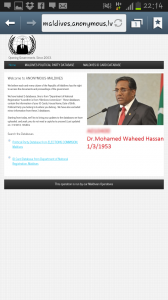The past fortnight has been dominated by the build up to, and the fallout from, the re-scheduled presidential elections. Due to take place on October 19, the poll was delayed at the eleventh hour when police blocked the removal of documents from the Elections Commission (EC).
The police’s decision – later criticised by the Human Rights Commission as well as the EC – came after the EC had been unable to obtain the signatures of the candidates as mandated by the Supreme Court for the completion of the voter registry.
Both Progressive Party of Maldives (PPM) and Jumhooree Party (JP) candidates had broken off contact with the EC, just as the commission neared completion of a frantic drive to re-register over 70,000 voters in less than two weeks.
The EC’s efforts were further placed in jeopardy by the court’s maintenance that any concerns regarding fingerprint verification must be addressed – a task that the commission maintained was beyond its capacity.
Re-registration was made harder still when PPM and supporters of its coalition ally the Maldivian Development Alliance (MDA) caused chaos in the re-registration queues after a systems malfunction. The police were again criticised by the EC for failing to come to its aid in a timely manner, with Chair Fuwad Thowfeek (fore-)telling Minivan News “there are people who want to block this vote”.
The police subsequently defended its role in delaying the election.
JP and PPM officials re-surfaced in the afternoon prior to the polling date to state that they would not sign the register without further verification – of 10 and 5 percent of fingerprints, respectively – before both parties returned to the Supreme Court, requesting the further delay of polls.
When the court failed to accede to these requests, the police obliged, prompting the Maldivian Democratic Party (MDP) to take to the streets in a peaceful sit-down protest that covered the length of Male’s main thoroughfare and beyond. In a rousing speech MDP candidate Mohamed Nasheed vowed to “establish good governance in the Maldives”.
Two nights of these protests followed, as did meetings between the EC and political parties, before the election was moved to November 9 – with a potential run-off scheduled for the 16th. The Supreme Court, however, has already deemed that its prior guidelines must be followed to the letter.
After deciding to withdraw his own candidacy for the new poll, President Waheed publicly expressed his doubt over credibility of the scheduled October 19 vote. Waheed also stated his refusal to acknowledge the five percent vote he had received in the first (annulled) poll.
In his latest foray into Maldivian politics, British businessman Richard Branson revealed this week that he had been on the verge of writing to Waheed to congratulate him on his handling of the democratic process before the vote’s deferral.
Waheed’s calls, the day before the scheduled vote, for parties to cease obstructing polling fell on deaf ears, as have his calls for conciliation. Waheed suggested to Indian media that he would threaten to resign if necessary, a sentiment strongly supported by Nasheed.
Fierce rhetoric has refused to abate in the aftermath of the cancelled vote, with the two presidential coalitions launching attacks on the EC, after having focused on one another prior to the 19th.
JP presidential candidate and MP Gasim Ibrahim called for the Majlis to declare a state of emergency in order to pursue criminal charges against the EC and Chair Fuwad Thowfeek – whose superhuman efforts prompted an outpouring of support from the public.
Meanwhile, the prospect of the court invalidating Nasheed’s candidacy altogether remains on the table as PPM council member Ibrahim ‘Wadde’ Waheed refused to defer to the requests of his leaders and withdraw his court case.
The MDP – who now enjoy a Majlis majority with the Dhivehi Rayyithunge Party (DRP) – tabled multiple no-confidence motions against senior cabinet members, as well as legislation to ensure the orderly transition of power from the executive to the speaker should the presidential term end (on November 11) without a successor having been chosen.
This flurry of activity in the legislature prompting the Supreme Court to fast-track the suspension of two MPs on charges of decreed debt.
Elsewhere
Aside from the elections, the police received continued criticism from Raajje TV regarding the station’s arson attack, with its chairman seeking international assistance to find the perpetrators.
One officer who failed to return from accompanying the ballot box to the UK was caught out on social media as he tweeted about his attendance at Arsenal’s Champions League game this week.
Following a suicide in Male’ in a location frequented by drug users, the National Drug Agency warned of a potentially lethal drug in circulation.
Finally, global climate justice NGO 350.org told Minivan News this week that the recent IPCC report only strengthened the world’s need for climate justice advocates such as former President Nasheed.

